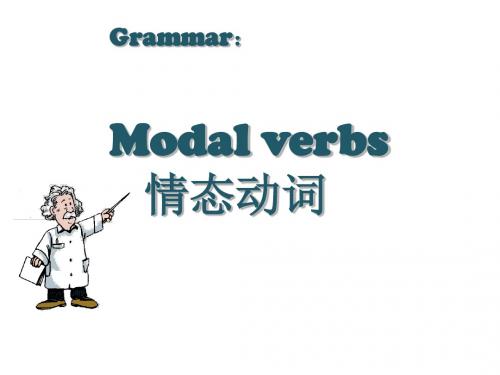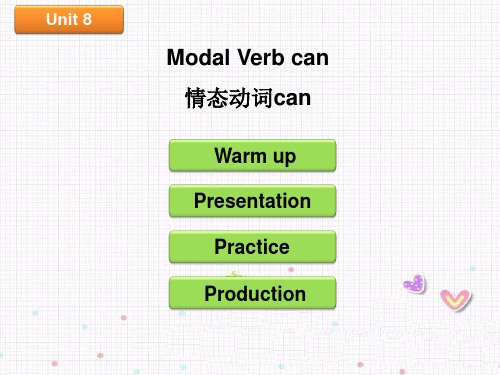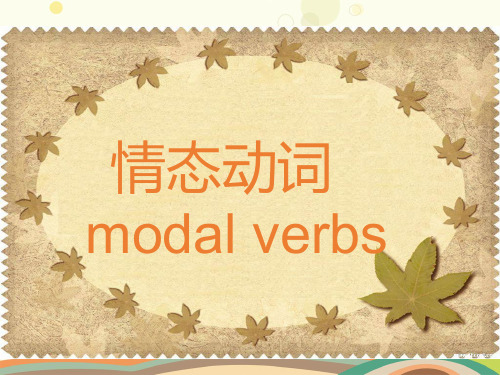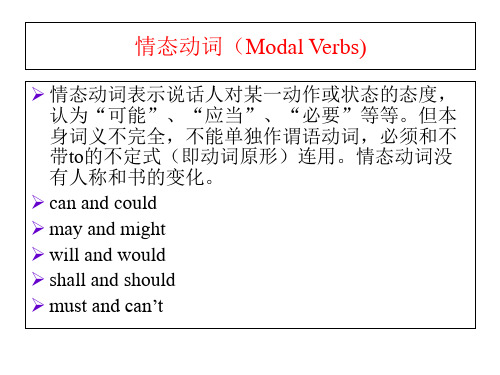【优质精选】中小学课件情态动词课件.ppt
合集下载
情态动词讲解ppt课件

A. may B. might C. could
D. must
10
may, might, can, could
表示猜测
➢ 1. They (can/might) ___m__ig_h__t___be away for the
weekend but I’m not sure.
表示许可
➢ 2. You (may/might) __m__a_y_____leave now if you
1.A computer ____ think for itself; it must be told what to do.
A. can’t B. couldn’t C. may not D. might not
1.I thought you ________ like something to read, so I have brought you some books.
2.表示推测时,could不是过去式,只是语气 更委婉;若是推测已发生的事或过去的情况, 用can/could have done
7
3.can和be able to辨析 can(could)和be able to都可以表示能力,意思上没有区别。 但can只有现在式和过去式,而be able to则有更多的形式。 如:
3
Ⅲ 情态动词的语法特征 1) 情态动词不能表示正在发生或已经
发生的事情,只表示期待或估计某事的 发生。
2) 情态动词除ought 和have 外,后 面只能接动词原形。
3) 情态动词没有人称,数的变化,即 情态动词第三人称单数不加-s。
4) 情态动词没有非谓语形式,即没有 不定式,分词,等形式。
1.It may rain this afternoon. 2.She might come to join us this afternoon. 3.I suppose he might have missed the train.
情态动词讲解精ppt课件

例句
will/would
详细描述:will 表示现在的意愿或 预测,would 表示过去的或虚拟 的意愿或预测。
1. I will help you with your project.(我会帮助你完成你的项 目。)
总结词:表示意愿或预测
例句
2. They would have gone to the party if they had known about it earlier.(如果他们早点 知道,他们就会去参加聚会。)
表示意愿
情态动词+动词原形,如 would like to go,表示 某人想要去。
形式变化
基本形式
情态动词的基本形式包括 现在时、过去时和将来时 。
过去式
情态动词的过去式通常是 在基本形式后面加-d或ed,如could have done 、should have done等。
将来时
情态动词的将来时通常是 在基本形式后面加-will或shall,如will be able to 、shall have to等。
may与might的区别与联系
总结词
may表示现在的许可或可能性;might表示过去的可能性或许可。
详细描述
may用于肯定句中,表示许可或可能性,例如“You may use this room.”(你可以使用这个房间。 )“The book may be in the library.”(这本书可能在图书馆里。)might表示过去的可能性,常 用于过去时态的句子中,例如“He might come tomorrow.”(他明天可能来。)
未必、很难说
She might not agree with us.
表示虚拟语气
will/would
详细描述:will 表示现在的意愿或 预测,would 表示过去的或虚拟 的意愿或预测。
1. I will help you with your project.(我会帮助你完成你的项 目。)
总结词:表示意愿或预测
例句
2. They would have gone to the party if they had known about it earlier.(如果他们早点 知道,他们就会去参加聚会。)
表示意愿
情态动词+动词原形,如 would like to go,表示 某人想要去。
形式变化
基本形式
情态动词的基本形式包括 现在时、过去时和将来时 。
过去式
情态动词的过去式通常是 在基本形式后面加-d或ed,如could have done 、should have done等。
将来时
情态动词的将来时通常是 在基本形式后面加-will或shall,如will be able to 、shall have to等。
may与might的区别与联系
总结词
may表示现在的许可或可能性;might表示过去的可能性或许可。
详细描述
may用于肯定句中,表示许可或可能性,例如“You may use this room.”(你可以使用这个房间。 )“The book may be in the library.”(这本书可能在图书馆里。)might表示过去的可能性,常 用于过去时态的句子中,例如“He might come tomorrow.”(他明天可能来。)
未必、很难说
She might not agree with us.
表示虚拟语气
情态动词语法 ppt课件

ppt课件 3
(3) 表示客观可能性即推测用法,多用于否定句和疑问句中, could只表示可能性比can小,不表时态。(否定推测) —Who is that man? Can it be your uncle? —No, it can’t be him. (4) can 也用在肯定陈述句中,表示理论上的可能性,意为“有 时可能会” Anybody can make mistakes. Even top students can make mistakes in the exam. 即使优秀学生在考试中也可能会出错。
ppt课件
14
(3)shall用在主语是第三人称的陈述句中,表示条约,规章,法令 等文件中表示义务或规定, 常用于官方文件中,表明具有法律效 力。(而should表示应该,义务)。 All payments shall be paid by the end of the month. 本月底所有款项必须付清。 No person shall carry a mobil phone into the examination room during the College Extrance Examination.
ppt课件 7
(2)may和might的用法
1. may和might表示请求、许可。 表示征求同意和允许,表征求同意时,might比may的语气更委 婉一些,否定回答时要用mustn’t表示“不可以”、“禁止”、“阻止” 之意。 may表示“允许”,否定形式为mustn't/can't,表示“禁止、不允 许、不可以”如: You may keep the book for a week. 这本书你可以保留一星期。 — Might I use your pen? — Yes, you may/can. —No, you mustn't/can't.
(3) 表示客观可能性即推测用法,多用于否定句和疑问句中, could只表示可能性比can小,不表时态。(否定推测) —Who is that man? Can it be your uncle? —No, it can’t be him. (4) can 也用在肯定陈述句中,表示理论上的可能性,意为“有 时可能会” Anybody can make mistakes. Even top students can make mistakes in the exam. 即使优秀学生在考试中也可能会出错。
ppt课件
14
(3)shall用在主语是第三人称的陈述句中,表示条约,规章,法令 等文件中表示义务或规定, 常用于官方文件中,表明具有法律效 力。(而should表示应该,义务)。 All payments shall be paid by the end of the month. 本月底所有款项必须付清。 No person shall carry a mobil phone into the examination room during the College Extrance Examination.
ppt课件 7
(2)may和might的用法
1. may和might表示请求、许可。 表示征求同意和允许,表征求同意时,might比may的语气更委 婉一些,否定回答时要用mustn’t表示“不可以”、“禁止”、“阻止” 之意。 may表示“允许”,否定形式为mustn't/can't,表示“禁止、不允 许、不可以”如: You may keep the book for a week. 这本书你可以保留一星期。 — Might I use your pen? — Yes, you may/can. —No, you mustn't/can't.
情态动词语法讲解PPT课件

2表示“许可”和“不许”
a)请求对方“许可”可用can, could, may, might.
may/might较正式,could/might较委婉
表示给予“许可”通常用can/may,而不用 could/might
Could I use your phone? Yes, of course you can. Might I trouble you for a light? You may indeed.
表示将来的“必须”,常用have to的一定 形式(will/shall have to) 比较:
•We must do it again.(表示现在)
•We’ll have to do it again.(表示将来)
•表示过去的“必须”,常用had to
•I had to leave at six yesterday.
•They must be home by now.(他们现在一定到家了)
will/would表示“推测”可有三种情况
1)对特定事态的推测
A: Who’s that man over there? B: That will be George, no doubt. C: That would be George, I except.
• Can they have missed the bus?
• Yes, they may have.
may not重音落在助动词上,表示 “不可能”,重音落在否定词上,表 示“不许可” , 比较:
•He may not go tomorrow.
•He may not go tomorrow.
•所以在书面语中,表示“不可能” 常用can’t
小学英语语法课件-情态动词can (共34张PPT) 全国通用

是的,可以。而且你还可以吃些蛋糕。 Birds can fly very high.
Hippos can’t fly and walk.
Lucy不可能在教室里面。
Presentation Sentences
Ostcrichacnan在’t fl句y. 子中表示允许,意为“可以” ,在口语中可以代替may。
Presentation Sentences
Can you please lend me your car? 你能借给我你的车用用吗? Could you help me with my English? 你能帮助我学英语吗?
can在句中表示请求,常用于“Can/Could you…?”句式。 can的过去式could用于现在时,可是语气更委婉,更客气。
What can bats do?
What can it do?
What can hippos do?
Can I come in ? 我可以进来吗? Can / Can’t I sit down?
Presentation Sentences
Dolphins can jump high and do tricks.
Practice Oral Practice 表示请求和许可:
我现在可以走了吗? 是的,可以。 不,不可以。
_C__a_n__ I go now? — Yes, you ___c_a_n_____. — No, you ___c_a_n_’_t____.
表示客观可能性:
Lucy不可能在教室里面。 Lucy _c_a_n_’_t___ be in the classroom.
— Can / Can’t he speak Japanese? — Yes, he can / can’t, but not well.
情态动词讲解ppt课件

1.Can this be an excuse for not giving them help? 表示惊异、怀疑、不相信 2.This can’t be true. 等态度,主要用在否定句、 3.How can you be so crazy. 疑问句和感叹句中。
考评项目赋标准分,对照考评内容和 考评办 法对考 评项目 进行考 评,评 出各考 评项目 的考评 实际得 分,考 评类目 下各考 评项目 考评实 际得分 之和为 该考评 类目的 考评实 际得分
2.表示推测时,could不是过去式,只是语气更委婉;若是推测已发生的事或过去的情况,用can/could have done
3.can和be able to辨析 can(could)和be able to都可以表示能力,意思上没有区别。但can只有现在式和过去式,而be able to则 有更多的形式。如:
考评项目赋标准分,对照考评内容和 考评办 法对考 评项目 进行考 评,评 出各考 评项目 的考评 实际得 分,考 评类目 下各考 评项目 考评实 际得分 之和为 该考评 类目的 考评实 际得分
语法 :情态动词
---Modal Verbs
考评项目赋标准分,对照考评内项目 的考评 实际得 分,考 评类目 下各考 评项目 考评实 际得分 之和为 该考评 类目的 考评实 际得分
After the accident it was a long time before she was able to walk again. The fire was very big, but most people were able to escape from the building.
I’ve always wanted to be able to speak fluent English. Those bags look really heavy, are you sure you’ll be able to carry them on your own?
情态动词-完整版PPT课件

情态动词 modal verbs
1.情态动词的用法特点
1)情态动词 除 ought 和 have 外,后面只能 接不带to 的不定式。 2)情态动词没有人称,数的变化,即情态动 词第三人称单数不加-s。 3)情态动词没有非谓语形式,即没有不定式, 分词等形式。
can could may might shall should must will would ought to
have to dare need used to
表示推测
情态动词
不表示推测
2.表示推测——情态动词的重要用法.
情态动词
对将来
对现在
对过去
m肯ust/定sho的uld 推测
+ V. + V. + have done
常见must be + be doi定的推测 can’t, couldn’t
疑问的推测
can, could
+ V.
+ V.
+ have done
+ be doing
可以用not表示“可能不”
+V.
+ V.
+ have done
+ be doing
+ V.
+ V.
+ have done
+ be doing
不同的“肯定”程度可按下列层次排列: He is at home. (事实) He must be at home.(非常肯定的推断) He ought to be at home.(很可能) He could be at home.(很可能) He may be at home.(仅仅可能而已) He might be at home.(或许, 非常不确定) He might not be at home.(也许不在家) He may not be at home. (比might可能) He couldn’t be at home.(很可能不在家) He can’t be at home.(一定不在家)
1.情态动词的用法特点
1)情态动词 除 ought 和 have 外,后面只能 接不带to 的不定式。 2)情态动词没有人称,数的变化,即情态动 词第三人称单数不加-s。 3)情态动词没有非谓语形式,即没有不定式, 分词等形式。
can could may might shall should must will would ought to
have to dare need used to
表示推测
情态动词
不表示推测
2.表示推测——情态动词的重要用法.
情态动词
对将来
对现在
对过去
m肯ust/定sho的uld 推测
+ V. + V. + have done
常见must be + be doi定的推测 can’t, couldn’t
疑问的推测
can, could
+ V.
+ V.
+ have done
+ be doing
可以用not表示“可能不”
+V.
+ V.
+ have done
+ be doing
+ V.
+ V.
+ have done
+ be doing
不同的“肯定”程度可按下列层次排列: He is at home. (事实) He must be at home.(非常肯定的推断) He ought to be at home.(很可能) He could be at home.(很可能) He may be at home.(仅仅可能而已) He might be at home.(或许, 非常不确定) He might not be at home.(也许不在家) He may not be at home. (比might可能) He couldn’t be at home.(很可能不在家) He can’t be at home.(一定不在家)
《情态动词讲解》课件

1
表示能力和可能性
这一用法涉及到情态动词在表示一个
表示推测和推断
2
人或事物的能力或可能性方面的应用。
情态动词还可用来表示具有推测性质
的情况和推断。
3
表示义务和建议
情态动词可用于表示某人应该或必须
表示意愿和打算
4
做的事情,或者提出建议。
用情态动词来表达某人的意愿或打算 进行的行为。
情态动词的否定和疑问
3 同时使用情态动词和实义动词时的注意事项
了解使用情态动词和实义动词时需要注意的细节。
总结
情态动词的重要性
深入理解情态动词的重要性,以及它们在语言中 的作用。
情态动词的学习方法
提供一些有效的学习方法,帮助您更好地掌握情 态动词的用法。
参考资料
书籍推荐
推荐一些深入学习情态动词的相关书籍。
网站推荐
建议一些在线资源,以便进一步学习和练习 情态动词。
2 may/might
表示推测和推断的情态 动词。
3 shall/should
表示义务和建议的情态 动词。
4 will/would
表示意愿和打算的情态动词。
5 must
表示必须和必然的情态动词。
情态动词的用法
情态动词有多种用法,我们将详细讨论其中的一些,包括表示能力和可能性、推测和推断、义务和建 议,以及意愿和打算。
特点
情态动词具有几个典型的特点,例如它们没有人称和数的变化,并且后面跟原形动词。
情态动词的种类
情态动词有几种常见的类型,我们将深入讨论其中的几个种类,包括can/could、may/might、 shall/should、will/would以及must。
1 can/could
情态动词详解ppt课件

She could / was able to sing like an angel
when she was a child.
2021精选ppt
8
3. 表示过去的能力 (1)could , was/ were able to 表示过去 一般的能力,即不表示做与未做某事。
She could / was able to sing like an angel
He should be around sixty years old. 他可
能60岁上下。
It’s nearly seven o’clock. Jack should be here
at any moment. (表示确定或期待)
2021精选ppt
15
4)should 表示推测时,表示确定或可能有 的未来或期望,即合乎理想的情况或结果。
He may not have finished the work.
He might have caught a cold.
2021精选ppt
20
5. Might have done
表示“本来可能……”,但实际上没有发生 的事。
另外,还可以表示“本应该或可以做某 事,”,含有轻微的责备语气。
You should not have swum in that sea.
that.
2021精选ppt
22
7. Needn’t have done
表示“做了本来不必去做的事情”, 注意:didn’t need to do 表示“没有必 要做而实际也免于做某事”。
You needn’t have taken a taxi here, for it was very near to my house.
when she was a child.
2021精选ppt
8
3. 表示过去的能力 (1)could , was/ were able to 表示过去 一般的能力,即不表示做与未做某事。
She could / was able to sing like an angel
He should be around sixty years old. 他可
能60岁上下。
It’s nearly seven o’clock. Jack should be here
at any moment. (表示确定或期待)
2021精选ppt
15
4)should 表示推测时,表示确定或可能有 的未来或期望,即合乎理想的情况或结果。
He may not have finished the work.
He might have caught a cold.
2021精选ppt
20
5. Might have done
表示“本来可能……”,但实际上没有发生 的事。
另外,还可以表示“本应该或可以做某 事,”,含有轻微的责备语气。
You should not have swum in that sea.
that.
2021精选ppt
22
7. Needn’t have done
表示“做了本来不必去做的事情”, 注意:didn’t need to do 表示“没有必 要做而实际也免于做某事”。
You needn’t have taken a taxi here, for it was very near to my house.
情态动词精品课件PPT课件

第22页/共52页
• It is usually warm in my hometown in March,but it can be rather cold sometimes.
• 我的家乡在三月份通常很暖和,但有时候也会相当冷。 • Mr.Bush is on time for ever ything.How can it be that he was late for the
meeting? • 布什先生做什么事情都很准时,他怎么可能开会迟到呢? • He can't be in the classroom ,for the light has been turned off. • 他一定不在教室里,因为灯已关了。
第23页/共52页
• 2.may用于肯定句中可以用来表示推测,意为“可能”;用于否定句中也可以表示 推测,may not意为“可能不”,表示一种不太确定的语气。may在疑问句中一般不 表示推测。
You'd better not. 等)不,你不可以用。
第11页/共52页
• 3.must和have to的用法 • must表示“必须、应该”。否定形式must not(mustn't)表示“不应该、不许可、
不准、禁止”等。在回答must的问句时,否定式常用need not(needn't)或don't have to表示“不必”,而不用must not,因为must not表示“禁止”。must表 示“一定、必定”等推测意义时,一般只用在肯定句中。 • The work must be finished as soon as possible. • 这项工作必须尽快完工。
第21页/共52页
• 热点考向二 情态动词表“推测”的用法 • 表示对目前或将来情况的推测往往用“情态动词+动词原形”这种结构。 • 1.can用于肯定句中表示可能性,意为“有时会”;用于疑问句中可以表示推测,意
• It is usually warm in my hometown in March,but it can be rather cold sometimes.
• 我的家乡在三月份通常很暖和,但有时候也会相当冷。 • Mr.Bush is on time for ever ything.How can it be that he was late for the
meeting? • 布什先生做什么事情都很准时,他怎么可能开会迟到呢? • He can't be in the classroom ,for the light has been turned off. • 他一定不在教室里,因为灯已关了。
第23页/共52页
• 2.may用于肯定句中可以用来表示推测,意为“可能”;用于否定句中也可以表示 推测,may not意为“可能不”,表示一种不太确定的语气。may在疑问句中一般不 表示推测。
You'd better not. 等)不,你不可以用。
第11页/共52页
• 3.must和have to的用法 • must表示“必须、应该”。否定形式must not(mustn't)表示“不应该、不许可、
不准、禁止”等。在回答must的问句时,否定式常用need not(needn't)或don't have to表示“不必”,而不用must not,因为must not表示“禁止”。must表 示“一定、必定”等推测意义时,一般只用在肯定句中。 • The work must be finished as soon as possible. • 这项工作必须尽快完工。
第21页/共52页
• 热点考向二 情态动词表“推测”的用法 • 表示对目前或将来情况的推测往往用“情态动词+动词原形”这种结构。 • 1.can用于肯定句中表示可能性,意为“有时会”;用于疑问句中可以表示推测,意
情态动词(共43张PPT)

A.Must; mustn't
B.Will; couldn't
C.May; can't
( C ) It's really hot in the room.You'd better
the
windows. A.not to close B.don't close C.not close
(B )
—You
drive after drinking, Simon.
—You're right.I'll take a taxi.
A.wouldn't B.shouldn't C.ought to
二、用恰当的情态动词填空。
Simon, you mmuussttnn''tt play with the knife.You mmayay
在回答以 may 提问的问句时,肯定回答一般可仍用 may 或 Yes, please./Certainly./Sure./Of course.否定回答根据说话人的语气 由强到弱分别选用: mustn't/can't/may not。 —May I watch TV? 我能看电视吗? —No, you mustn't.You must play the piano first.不,你禁止看, 你必须先弹钢琴。
need 的基本用法 意为“需要;必要”,作情态动词时常用于否定句和疑问句中。 You needn't hand in your homework tomorrow.你明天不需要 交你的作业。 Need I attend the meeting this afternoon? 我需要今天下午参 加会议吗?
情态动词 专题课件(共28张PPT)

➢ 5. (may/can) ____c_a_n_____you swim? 表示能力
➢ 6. Listen, please. You (may not/might not)
____m__a_y__n_o_t______ speak during this exam.
表示不允许
may, might, can, could
may, might, can, could
表示猜测
➢ 1. They (can/might) ____m_i_g_h_t___be away for the
weekend but I’m not sure.
表示许可
➢ 2. You (may/might) ___m__a_y____leave now if you
can and could
➢So he can carry heavy books. ➢ability ➢He couldn't open the door by himself. ➢ability ➢Could you open the door, please? ➢request
can and could
表示猜测(不可能)
➢7. They (can not/may not) ___c_a_n_n_o_t_______ still be out, the light is on in the house.
➢8. You (couldn’t/might not) 表示许可
____c_o_u_ld_n_’_t_______ smoke on the bus.
➢9. With luck, tomorrow (can/could) ___c_o_u_ld____be a cooler day. 表示猜测
- 1、下载文档前请自行甄别文档内容的完整性,平台不提供额外的编辑、内容补充、找答案等附加服务。
- 2、"仅部分预览"的文档,不可在线预览部分如存在完整性等问题,可反馈申请退款(可完整预览的文档不适用该条件!)。
- 3、如文档侵犯您的权益,请联系客服反馈,我们会尽快为您处理(人工客服工作时间:9:00-18:30)。
--Sorry, she____ come to the phone
because she isn’t in.
A. Might; won’t B. Can’t; mustn’t
C. May; can’t D. Couldn’t; shouldn’t
3. --- I want to know if I _ smoke here. --- No, you____ . Could you see the sign “NO SMOKING” there?
D. can
13. The fire spread through the
building very quickly but everyone
____ get out.
A. had to
B. would
C. could
DD. was able to
14.---What do you think of this answer?
A.will B. should C. can D. need
10. Joan_____ come with us this afternoon, but she isn’t very sure yet. A. can B. may C. must D. will
11. I _____ ask you the question because I think I _____ be wrong.
A.daren’t; must B. mustn’t; can C. needn’t; may D. can’t; should
12. It’s nearly eight o’clock. Mike
_____ be here at any moment.
A. need
B. has to
C. should
18. ---Why! I couldn’t get you on the phone this morning. --- We _____ tennis in the yard when you phone me.
A.could be playing B. must be playing C. must have been playing D. should have played
B. needn’t
C. not D. mustn’t
16. He doesn’t have to work tomorrow,
but you have got to, ____ you?
A.don’t
B. haven’t
C. haven’t got D. can’t
17. You_____ wake me up when I fall asleep, ______ you? A. haven’t better; have B. would not rather; would C. had better not; should D. had not better; must
20. ---I came here by taxi and the driver charged me 50 yuan. ---Really? You _____ have come by bus.
情态动词专项练习
1.–May I sit beside you, sir?
--- No, you ______. My girlfriend is
coming soon.
A.can’t
B. mustn’t
C. needn’t
D. shouldn’t
2.-- _____ I speak to Mary, please?
A. mustn’t; can B. can’t; has to C. daren’t; should DD. needn’t; may
7. --- __ I tell Mary the test results? --- No, you____. She’s already got
the score. A. Will; won’t BB. Shall; needn’t C. May; mustn’t D. Can; don’t
C. would
D. has to
5. --- ____ you pass me the English magazine, please? --- Sure. Here you are.
A.Could B. Need C. Must D. Might
6. ---Must I go to work with you? --- No, you_____. Linda ______ go with me.
8. You ____ be careful when crossing
here. The traffic lights aren’t working.
A. might
B. ought to
C. could
D. may
9. ---Could I borrow your bicycle? --- Yes, of course you_____.
---I don’t think it ____ be right.
A.should
B. might
C. must
D. can
15. --- Is John coming by train?
--- He should, but he ___. He likes
driving his car.
A. can’t
19. --- We didn’t see him at the lecture.
--- Neither did anybody else. He _____ it. A. may not have attended B. mustn’t attend C. can’t have attended D. couldn’t attend
A.can; needn’t B. must; can’t C. shall; won’t D. may; mustn’t
4. My wife never remembers my
telephone number. She always ____
look it up.
A. must
B. should
